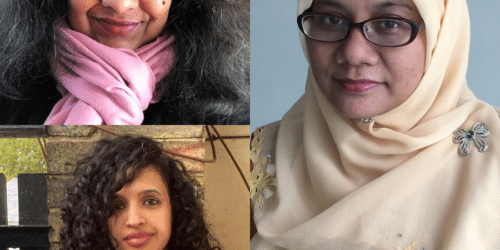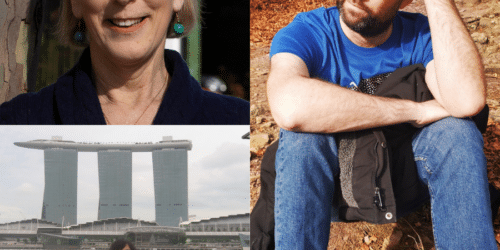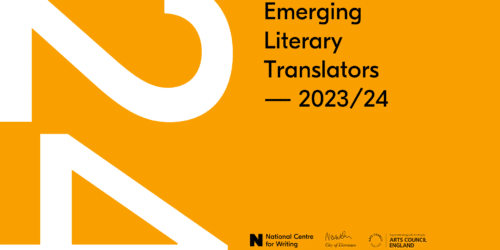
In the summer of 2015, the acclaimed South Korean novelist Han Kang stayed in this Fine City as our latest UNESCO Writer in Residence, sponsored by the Arts Council of Korea.
She attended Worlds, gave readings in Norwich, London and Edinburgh, translated poetry, explored the Norfolk landscape, met her publishers at Granta and prepared the proofs of her next novel, Human Acts (due to be published in the UK in January in Deborah Smith’s translation).
Following the BCLT Summer School, a practical symposium was organised to explore some of the issues around translation. Taking place on the 3rd of October at the Free Word Centre, Translation in the Margins will investigate the radical edges of literary translation. (Find out more about the event.)
Here, Han Kang reflects on the experience of being a guest author at the BCLT Translation Summer School in July. With additional support from the Korean Literary Translation Institute, a number of novice literary translators participated in a week-long workshop with Deborah and Daniel Hahn, testing different approaches to translating Kang’s fiction in the presence of the author herself. Kang’s fascinating diary entries form the basis of her account of the process. The below piece was translated by Deborah Smith.
Slowly, as slowly as possible
This summer just past, I spent two months in the small, peaceful British city of Norwich, supported by the British Council and the Korean Arts Council, ARKO. As it happened to coincide with my residency, I also participated as a writer in the translation workshop held for a week every July at the University of East Anglia. That workshop was on a larger scale, and more intensive, than any other translation programme I had previously heard of or experienced. Translation sessions were organised by language, for Dutch, German, Norwegian, Italian, and even Korean, included this year for the first time. Workshops were also held under the name of ‘multi-language sessions’, translating literary works from a variety of languages into English, shared between poetry and prose classes.
On Sunday 26th July, the evening before the workshop commenced, the participants gathered in the campus bar for the opening event. It was scheduled to be led by Deborah Smith, who has translated my novels The Vegetarian and Human Acts, with help from the translator and author Daniel Hahn, who frequently dropped in on our sessions. After the writer and translators had shared brief introductory remarks, Daniel said with a smile, “My role in these sessions will be to obstruct the work of translation as much as I can, in order for it to progress slowly, as slowly as possible.” I nodded, because I liked the sound of those words ‘as slowly as possible’. I thought it was lucky that this was not to be a workshop where everything was done ‘as quickly as possible’. Of course, at that point I was unable to guess just how slowly our sessions were going to go.
Monday
Because the participants who were coming from Korea arrived late on the Sunday night, I was only able to meet everybody in our session first thing on the Monday. Sophie, Hyo-kyung, Victoria, and Celin, students from LTI Korea’s Translation Academy, and their professor Kim Chung-hee. Roxanne, who studies Korean literature at SOAS in London.
The text we were to translate that week was my short story “Europa”. At Deborah’s suggestion, I first briefly explained my motivation for writing the story, and what I had thought particularly important about it, and straight after that the translation began. After each member had translated the first sentenced, they took in it turns to present their translations. After Deborah had typed them up on the computer, she examined each individual word in minute detail – even down to the punctuation marks. She led the discussion tirelessly, neither agreeing completely with one person’s translation nor unilaterally dismissing another’s. In that first session, which took place from 11am to 1pm, I was shocked to see that we didn’t even manage to fully translate one sentence. “The important thing is the process,” Deborah said.
The afternoon session was held from 3.30pm to 5.30pm; Daniel came in, and was entirely satisfied with the slow speed of our progress. He had the students read the sentence that was being translated out loud, and after also having me read the Korean, stressed the desirability of the sense of rhythm given by the length of the sentences in the two languages being as similar as possible. Eventually, once three sentences had been completed, when we parted having arranged to meet again the next day, Deborah said that as we continued with the translation, the sentences we thought were ‘done’ could in fact be revised almost endlessly, to make sure they matched with the following passage.
‘This extremely delicate, elaborate process was giving me a very particular sense of deja vu.’
Instantly I realised that this extremely delicate, elaborate process was giving me a very particular sense of deja vu. All of this was what I myself did every day. Changing the position of a word, rearranging the order of sentences, cutting out unnecessary words, reading out loud, reading out loud again from the first sentence after writing the final sentence, cutting more words, taking out punctuation, putting it in, cutting again. Accepting dispassionately the fact that after writing the next day’s sentences, today’s might all have to be cut, forcing me to re-write everything from the beginning.
Tuesday and Wednesday
Various observers (people from the Writers’ Centre Norwich, the British Council, teachers and students from the creative writing MA course) came in and watched our sessions, cautiously giving their opinions if we happened to be struggling with certain words, certain expressions. Their input almost always made our debates all the richer, and there were times when it enabled us to suddenly get to the nub of the matter and make progress.
The interesting thing, was the fact that, in direct contrast to the translated sentences given by the participants on the Monday being generally rather similar, the more time went by the more varied the expressions which appeared became. Rather than automatically transposing the original Korean sentence structure, they began to concentrate on the ‘feeling’ of that sentence and inventively seek an English expression which could vividly convey that feeling. Deborah continually encouraged them in this by saying things like “Isn’t this sentence a bit plain?” “What might be an expression that isn’t flat?” “Ah, that’s too bland”, “This expression is awkward in English”.
The result was that on Tuesday we succeeded in translating five sentences and connecting them with the previous three. Before we turned in for the day, everyone read it out loud and exclaimed how happy they were with it. Because we were all well aware of how difficult it had been to find a point of contact and come up with sentences which satisfied us all. Following on from this, on the Wednesday we translated a section of dialogue. We put our heads together to reach an agreement as to how colloquial it should be, what were the idiomatic expressions that are written in English in similar situations. Wanting to test that it was sufficiently natural-sounding, the participants even acted the conversation out, and burst out laughing in doing so.
Thursday
In the early hours of the morning, I had a dream. Someone was lying in a white bed, and I was quietly watching them. Their face was covered with a white sheet, so I couldn’t tell whether they were male or female. Somehow, I was able to hear what he/she was saying. ‘I have to get up now…no, that’s too flat.’ ‘I really will have to get up now…no, that’s too bland.’ ‘I have to leave this bed…no, that’s awkward.’
Having woken from the dream, I thought of the participants in our session, and thought of Deborah, who had translated two of my novels, and finally thought of myself. I thought about the lives of the struggling people beneath the white sheet that covered their faces, tenaciously asking questions of and answering themselves, ceaselessly rewriting sentences.
In the session that morning, everyone enjoyed hearing about my dream. (I have come to realise that it is possible for someone’s nightmare to make many people happy). In the second session that day, we translated eight lines with surprising concentration, making it the day when our yield was greatest.
Friday
On Friday, which was the final day, after putting the finishing touches to our translation in the morning session, in the afternoon we shifted to the Writers’ Centre in Norwich city centre and had a session set aside for presentations. The translation sessions for European languages had translated quite a lot of pages in a week, as might be expected for languages from the same family, whereas we had managed to produce only a little over a single page, from the very beginning of the story. During the fifteen minutes allotted in the presentation session, the participants for our session stood up on stage and read their translation as slowly as possible, and took it in turns to speak methodically about the minute difficulties of the translation process. Sitting in the audience, I was quite moved.
People who delight in the intricacies of language. People who take even the most minute difference to be something large, important, significant. People who, through that keen sensibility, give a single text a new birth in another language. People who move forwards following that strange, beautiful rule which says that it is good to go as slowly as possible. People who ask questions of and answer themselves, alone beneath the white sheet, ceaselessly re-writing sentences. I felt touchingly grateful to everyone in our session, including Deborah – no, somehow to every translator in the world.
Each of the other sessions’ presentations was also enjoyable. There was one group who, at the beginning and end of the passage, had the writer and translator read at the same time, producing an effect akin to music, and there was one who, after two people had translated the same text, read a passage from the various versions, so that we could appreciate the differences. There was one group who amused the audience by humorously disclosing that, as their session leader had been unable to attend due to personal reasons, and the only participant in the week who was able to speak that language had arrived late, the other participants had spent the entire week engaged in a bitter struggle, relying only on a dictionary, at the end of which they had managed to produce a grand total of three sentences. I laughed along with the rest, of course, but I also thought it was a bit of a shame. That there was a group who’d succeeded in going even slower than our session had…
About Han Kang
Han Kang is the daughter of novelist Han Seung-won. She was born in Kwangju and at the age of 10, moved to Suyuri (which she speaks of affectionately in her work “Greek Lessons”) in Seoul.
She studied Korean literature at Yonsei University. She began her writing career when one of her poems was featured in the winter issue of the quarterly Literature and Society. She made her official literary debut in the following year when her short story “The Scarlet Anchor” was the winning entry in the daily Seoul Shinmun spring literary contest.
Since then, she has gone on to win the Yi Sang Literary Prize (2005), Today’s Young Artist Award, and the Korean Literature Novel Award. As of summer 2013, Han teaches creative writing at the Seoul Institute of the Arts while writing stories and novels.







